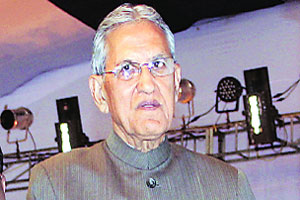Time for rewind in state of split verdicts
If House is hung,UP Governor has a number of precedents before him

With all exit polls having predicted a hung assembly in UP,all eyes will be on a man who has kept Raj Bhavan out of any major controversy during his two-and-a-half-year tenure so far. And as Governor B L Joshi seeks to interpret the election results,he will have before him a number of precedents in a state that has returned a number of split verdicts in the last two decades.
Now that he may be called upon to make his most important decision yet,sources said,he has been taking legal views and studying the Constitution,Supreme Court and high court judgments,besides all the precedents in Raj Bhavan.
Indeed,only once since 1991 has UP returned a majority verdict in 2007,when the BSP formed the government. There have been three fractured verdicts in between.
In 1993,the BJP emerged the single largest party with 177 seats against a majority requirement of 212 Uttarakhand had not separated from UP yet. Governor Motilal Vora refused to accept the BJP claim to form a government,taking the line that the results were a verdict against the BJP. The party had won a majority in 1991 and formed a government under Kalyan Singh,before the government was dismissed after the demolition of the Babri Masjid. Vora chose to invite the Samajwadi Party-BSP coalition; their alliance had won 109 and 67 seats.
In 1996 were mid-term elections in which the BJP,SP,BSP and Congress won 174,110,67 and 33 seats respectively. Although the BSP and the Congress were in alliance,their total was far below 212. The BJP claimed it had the numbers to form a government but governor Romesh Bhandari was not satisfied and recommended that the Assembly be kept under suspended animation.
The state was placed under Presidents rule. After about five months,on March 19,1997,the BSP and the BJP got together and made a fresh claim. Mayawati was sworn in as Chief Minister on March 21,1997.
In 2002,after Uttarakhand had been formed and with the majority mark now 202,the SP with 143 seats was the single largest party,while the BSP got 97,the BJP 88,the Congress 26 and the RLD 14. This time,the SP claimed it could prove its majority on the floor of the House but governor Vishnu Kant Shastri was not convinced and he recommended Presidents rule. Later,a BSP-BJP-RLD coalition made a claim to form the government. Governor Shastri invited Mayawati to form the government and she was administered oath on May 3,2002.
Apart from these precedents,Joshi has been closely following the voting trends right from the first phase,Raj Bhavan sources said. He is happy with the high polling across the state,having reportedly observed that it is a good sign for any democracy.
For the first half of Tuesday,though,Joshi will be away from Raj Bhavan. He will accompany President Pratibha Patil to a function of the Indian Air Force in Bareilly, said a Raj Bhavan source. Joshi will be back in Lucknow in the evening.